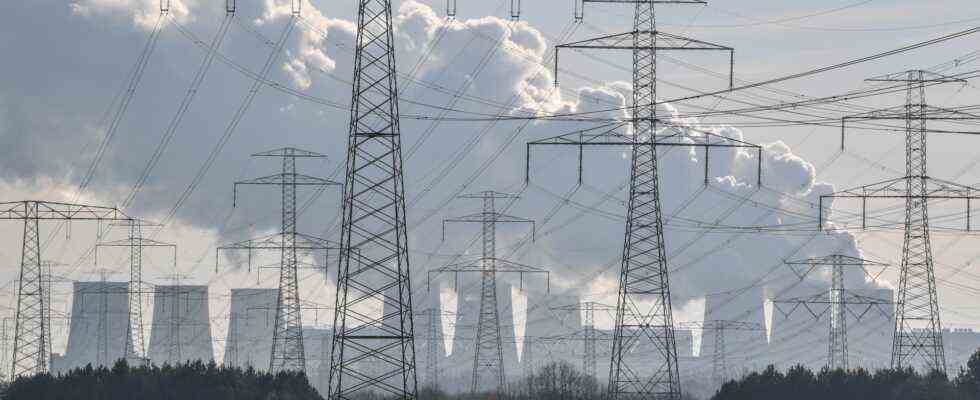Status: October 5th, 2021 3:00 p.m.
Europe’s politicians are worried about the high energy prices. It remains to be seen whether the EU will give a common answer. The disagreement could jeopardize Europe’s ambitious climate protection plans.
It is not too often that Europe’s finance ministers deal with a topic that is so hot for the citizens: At their meeting in Luxembourg, the energy price shock was at the top of the agenda – and millions of Europeans feel it directly in the wallet.
Some EU states have taken countermeasures at national level. Spain is temporarily lowering VAT on electricity, France is capping the prices for electricity and gas until April and is issuing energy vouchers worth 100 euros to six million households. But in the view of the governments in Paris and Madrid that is not enough to take the pressure off the price hike.
In Luxembourg, France, Spain and Greece called for joint action from all member states. Italy joined several demands.
Build up your own reserves
Since the beginning of the year, the wholesale prices for natural gas have more than tripled, particularly sharply in the past few weeks, and as a result, so have the electricity prices.
There are several reasons for this: The economic recovery after the pandemic is increasing demand, and the hunger for energy is growing, especially in Asia. The amount of natural gas produced in Europe fell, among other things due to maintenance work in a Norwegian gas field. In addition, the Russian producer Gazprom delivers the amount agreed in the contracts with Europe – but no more.
Demand for EU energy reserve
The EU southern axis proposes to regulate European gas stocks more closely and to set up a strategic EU energy reserve. This could strengthen the EU position in negotiations with international gas producers and help the 27 speak with one voice.
France’s Finance Minister Bruno LeMaire calls for the electricity price to be decoupled from the gas price. The Paris government also wants to create a direct link between the average cost of electricity generation in each country and the cost to end users.
Debate on the need for joint action
The governments in Paris and Madrid are calling for EU-wide coordinated measures because they consider high energy prices to be a permanent problem. However, not all member states see it that way. For Finland, helping the people is a national matter. The federal government is holding back. In Germany there are mainly long-term gas supply contracts, which means that prices fluctuate less than in some neighbors.
The EU Commission regards the price increases as a temporary phenomenon. Your deputy boss Valdis Dombrovskis names temporary factors and high national gas prices as the main causes. The high inflation rate, driven especially by energy costs, will soon fall again – the head of the Eurogroup, Ireland’s Finance Minister Paschal Donohoe, was convinced of this in Luxembourg.
The EU Commission intends to submit proposals shortly
The Commission wants to present measures against the consequences of high energy prices in the coming week. According to EU Economic Commissioner Paolo Gentiloni, they should be limited in time and targeted.
Some EU states use the opportunity to fundamentally question the planned sustainable restructuring of Europe. In July, the EU Commission proposed twelve laws in its Fit-for-55 package to reduce emissions of climate-damaging greenhouse gases by 55 percent by 2030 compared to 1990 levels, as agreed. In return, the consumption of fossil fuels is to become steadily more expensive, for example through a new emissions trading system for buildings and traffic.
Eastern European countries, on the other hand, are mobilizing, especially Poland. The government in Warsaw demands that the social consequences of the climate measures be examined. In line with your argument: energy is expensive enough, we cannot expect our citizens to be exposed to additional burdens. Brussels, on the other hand, holds that the further the sustainable restructuring of Europe progresses, the lower the dependency on fossil fuels will be.
France is committed to nuclear power plants
Meanwhile, France continues to campaign for nuclear energy. The country gets 70 percent of its electricity from nuclear power and wants to anchor nuclear energy as an environmentally friendly technology in the future EU financial regulations. This so-called taxonomy determines in which areas sustainable investments flow.
Germany and Austria are strictly against it. Spain is not on the side of France on this issue either. A decision should be made in autumn.
Energy prices are becoming a top priority
Poor households suffer particularly from high costs for heating and electricity because they have to spend an above-average part of their income on them. That is why the social consequences of the high energy prices should be cushioned – the EU governments are basically in agreement on this. Whether the EU must act together to achieve this, and if so, how – the finance ministers in Luxembourg passed this question up. In two weeks the heads of state and government will deal with it at the EU summit.
Energy prices: no common line among EU finance ministers
Jakob Mayr, ARD Brussels, October 5, 2021 3:11 p.m.

